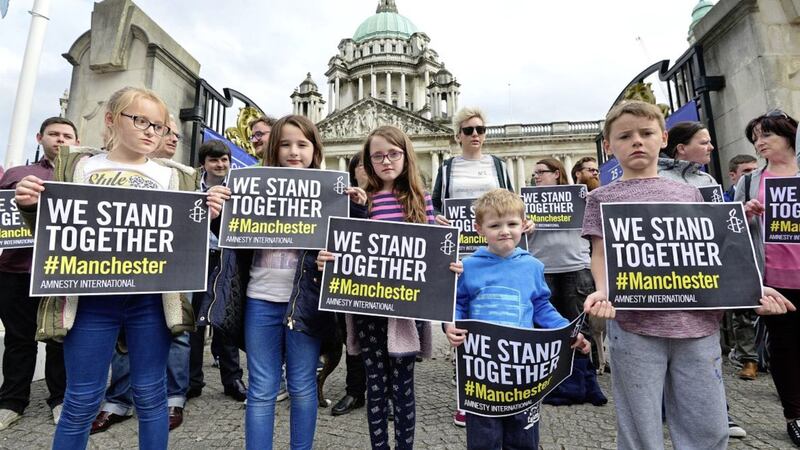Last Tuesday morning, 5.15 am. I started dragging myself into consciousness, as normal, briefly skimming news headlines, then straight onto Classic FM.
I’d noticed the devastating bomb attack. My morning fog assumed the headline meant Manchester in New Hampshire, the United States.
Only with the 6am radio news did I waken up. Manchester, England – home to family and friends.
Much of the city’s healing over the past week has been driven by citizens courageously promoting the unity of people and purpose; refusing to allow any reaction that might nudge the murderer’s fundamentalist agenda into a self-fulling prophecy of racial and religious division.
This unity must be sustained.
Alongside oceans of human hurt and acres of security analysis, there is also a need to look hard into history for flickers of hope that can help enlighten the different world we would wish to build; a world worthy of the innocent beauty stolen across the globe everyday by extremism and fanaticism.
We increasingly need to think critically about how we frame that world, how we practically translate the finest possible vision and values into transformed reality.
It is natural that academics and politicians will debate the cause and effect factors in global conflict and tragedy – whether terrorism in Manchester, drownings in the Mediterranean, starvations in North Africa, or military interventions in the Middle-East.
That discourse is vital in sharpening international policy planning, and models of security and social justice, to prevent continuous cycles of such devastation. Importantly, it requires the honesty of self-reflection not the hubris of self-delusion.
But the one unconscionable thread that undeniably links all such situations is the preventable waste of innocent human life. And it is this reality – focused again by Manchester - that urgently demands a revolution in how we relate to each other, how we create a culture of greater harmony in humanity, both globally and locally.
We must become fierce in celebrating our diversity and our difference - disavowing labels of exclusion and stereotypes of dehumanisation; recognising and respecting that the multi-colour of our cultural and religious and political perspectives represents the glowing rainbow of democratic civilisation.
We need to cross the boundaries of our respective races and creeds in demanding and defending more open social structures with improved outcomes, guided by the blinding light of universal democratic values and the energy to brighten each colour more equally.
That’s not a Pollyanna pipe-dream. It is, in fact, the only objective basis on which we can ultimately address the chilling intensification of terrorism, instability, power-games and military intervention – cycles of reaction and counter-reaction - which the world is now facing.
Only through boundary-crossing – the cross-pollination of democratic values and humanitarian philosophies - can we start breaking down the barriers upon which unaccountable powers rely for their frighteningly authoritarian agendas.
Participative democracy means moving beyond the artificial boundaries that define our own limitations. We must begin to unveil new dawnings of insight for those with whom we differ – mutually inspiring revelations, provoking new understandings. Not just internationally, but here in Ireland too.
For it is the boundary-crossers - those who shatter the shibboleths and rattle controlling traditions, those who critically reconsider and openly reframe their own and others’ views - who will always channel the greatest positive change in any society. Fundamentalism is failure.
We need to foster and elevate a widespread culture of questioning, critical thinking - a sustained effort to empower every individual citizen in the battle of ideas against every damaging dogma.
Educated empowerment is a silver bullet for individuals to confidently challenge the criminal thinking or closed cultures that suggest attacking unarmed civilians is something to ever be justified, rewarded or explained away – whether by the lie of immortality, the lure of medals, or the legacy of memorialising.
On Monday, the United States celebrated the 100th anniversary of John F Kennedy’s birth. In hailing the challenge of a ‘New Frontier’ as he successfully sought the White House in July 1960, President Kennedy’s powerful words still resonate today:
“I believe that the times require imagination and courage and perseverance… My call is to the young in heart - regardless of age, to the stout in spirit - regardless of party, to all who respond to the scriptural call: ‘Be strong and of a good courage; be not afraid, neither be (thou) dismayed.’”
Six months earlier, JFK’s presidential campaign had begun with the New Hampshire Democratic primary, and a visit to a town called Manchester. In past history, there are always flickers of hope. In days of darkness, we must always kindle their flames.








